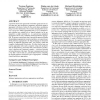Free Online Productivity Tools
i2Speak
i2Symbol
i2OCR
iTex2Img
iWeb2Print
iWeb2Shot
i2Type
iPdf2Split
iPdf2Merge
i2Bopomofo
i2Arabic
i2Style
i2Image
i2PDF
iLatex2Rtf
Sci2ools
140
click to vote
ATAL
2007
Springer
2007
Springer
Reasoning about judgment and preference aggregation
Agents that must reach agreements with other agents need to reason about how their preferences, judgments, and beliefs might be aggregated with those of others by the social choice mechanisms that govern their interactions. The recently emerging field of judgment aggregation studies aggregation from a logical perspective, and considers how multiple sets of logical formulae can be aggregated to a single consistent set. As a special case, judgment aggregation can be seen to subsume classical preference aggregation. We present a modal logic that is intended to support reasoning about judgment aggregation scenarios (and hence, as a special case, about preference aggregation): the logical language is interpreted directly in judgment aggregation rules. We present a sound and complete axiomatisation of such rules. We show that the logic can express aggregation rules such as majority voting; rule properties such as independence; and results such as the discursive paradox, Arrow’s theorem a...
Related Content
| Added | 07 Jun 2010 |
| Updated | 07 Jun 2010 |
| Type | Conference |
| Year | 2007 |
| Where | ATAL |
| Authors | Thomas Ågotnes, Wiebe van der Hoek, Michael Wooldridge |
Comments (0)

